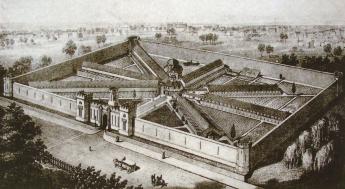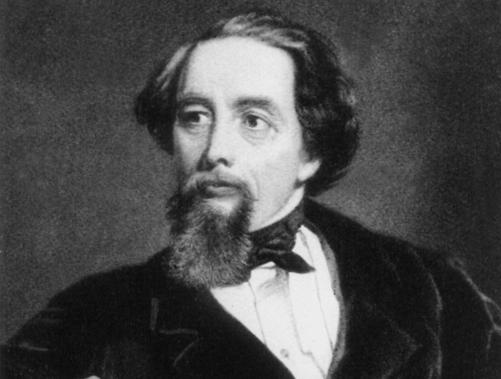Related Topics
Outlaws: Crime in Philadelphia
Even the criminals, the courts and the prisons of this town have a Philadelphia distinctiveness. The underworld has its own version of history.
Literary Philadelphia
Literary
Tourist Walk in Olde Philadelphia
Colonial Philadelphia can be seen in a hard day's walk, if you stick to the center of town.
Tourist Trips Around Philadelphia and the Quaker Colonies
The states of Pennsylvania, Delaware, and southern New Jersey all belonged to William Penn the Quaker. He was the largest private landholder in American history. Using explicit directions, comprehensive touring of the Quaker Colonies takes seven full days. Local residents would need a couple dozen one-day trips to get up to speed.
Right Angle Club: 2014
New topic 2013-11-19 20:22:11 description
At Times, Charles Dickens Was a Little Immature

|
| Eastern State Penitentiary Aerial View |
Every once in a while, Philadelphia needs to be reminded of its Quaker origins, and the surprising number of people who will suddenly make an appearance to defend Quaker ideas. It would appear that Philadelphia needs to be reminded that Quakers see a value, even a joy, in silence. The present entrepreneurs in charge of Eastern State Penitentiary, presently a Hallowe'en showplace, are to be congratulated for rehabilitating a neighborhood formerly in decay. If you are looking for a collection of exotic restaurants after visiting the neighborhood art museums, this is the place to go. But I do wish somebody would put an end to the myth that silence and solitary confinement can drive you crazy because I don't believe they will.
Every Quaker family has to handle the problem that children don't naturally like to sit still. The first few times Quaker children are brought to meet, the kids have to be shushed, given books to read, and eventually be led out early to sit in the First-Day (Sunday school) classrooms, while their parents go back to the meeting room to sit in silence. Some kids get the message quicker than others, and the ones who keep misbehaving in meeting eventually have to face general disapproval as "spoiled" until they either quiet down or get sent to boarding school. So Quakers are familiar with the problem, learn how to deal with it, and tend to regard resistance to silence as a sign of immaturity.

|
| Charles Dickens |
Charles Dickens was once a newspaper reporter in Philadelphia and wrote many ecstatic articles about the city. However, he was paid by the word, and prospered mightily from some unnecessarily long articles directed to the folks back in England. One of them was a description of Eastern Penitentiary, built on the principle of the rehabilitation of criminal behavior by long periods of solitude, remote from distracting criminal influences in the community at large. The idea, which may well have originated with Dr. Benjamin Rush, later called the father of American Psychiatry, was widely imitated. There soon were over three hundred prisons throughout the world, dedicated to the idea and imitating the architecture. Whether he believed it or not, Dickens wrote a long, long, diatribe against the concept of solitude as rehabilitating, in which he imagined himself in the position of the poor prisoner, and declaring it would drive him crazy. Without much argument, Charles Dickens was responsible for the shift in public attitudes which eventually led the Board of Prisons to decide to tear it down. This was not exactly evidence-based psychiatric reasoning since a great many crazy people get sent to prison anyway. It isn't surprising that lots of crazy people were found in Eastern Penitentiary, but it isn't exactly proven that solitary confinement made them into lunatics. In fact, it isn't being based on evidence to claim that either the outcome of recidivism or the outcome of improved behavior is influenced by any form of incarceration, with or without corporal punishment, with or without capital punishment. It is definitely proven that incarceration is as expensive as psychiatric treatment, but that isn't saying a great deal. You can definitely cause temporary insanity with prolonged sleep deprivation, but you would suppose that solitary confinement would increase the amount of sleep, not reduce it.
When the time came to demolish Eastern Penitentiary, the Board of Prisons was advised it was so solidly constructed it was simply too expensive to tear it down. As the neighborhood gentrified, real estate values rose, but never enough to justify the demolition of what was essentially a fortress. Even the relentless forces of decay have continued to be slower than the rise of rising in the price of the land. It's like those medieval castles still standing in Europe, occasionally attracting some American billionaire, but mostly just hollow shells. The deterioration on the interior is apt to go faster than deterioration of those stone walls, so the cells formerly occupied by Willie Sutton and Al Capone will need restoration sooner than the towers and parapets. But driving people crazy? It's doubtful. Its function was mostly to segregate the criminal elements of each succeeding wave of immigrants, as a quick review of the surnames of inmates easily demonstrates.>/p>
Originally published: Saturday, October 11, 2014; most-recently modified: Monday, May 13, 2019